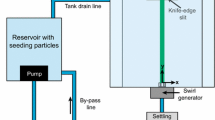Summary
Keller et al. (1985) have shown that, in analogy to the theory of gravity currents, there exist two types of force-free transitions (i.e. vortex breakdown phenomena) between axisymmetric vortex-flow states in tubes.
This paper presents an extension of our earlier analysis, which is based on a variational principle and does not account for viscous effects and shear layer instabilities, to axisymmetric vortex flows in tubes with varying cross-sectional area.
A broad investigation into the properties of steady axisymmetric vortex flows is given, in so far as they can be represented by perfect-fluid theory and simple extensions of it. It is argued that the basic physics of such flows, including vortex breakdown phenomena, can be explained with the help of the relatively simple theoretical concepts proposed. Numerical results are presented which show complete flow fields of loss-free transition in diffusers for various types of vortex flows. LDA-measurements and flow visualization experiments proove the existence of two types of transitions, as proposed by the analysis, and show the significance of critical cross-sections in the flow.
Zusammenfassung
Keller et al. (1985) haben gezeigt, daß in Analogie zur Theorie der Schwereströmungen zwei Arten von impulserhaltenden Übergängen (i.e. Vortex-Breakdown-Phänornene) zwischen axisymmetrischen Wirbelströmungszuständen existieren.
Diese frühere Theorie, die auf einem einfachen Variationsprinzip basiert und Reibungseffekte sowie Scherschichtsinstabilitäten nicht berücksichtigt, wird in dieser Arbeit auf axisymmetrische Wirbelströmungen in Rohren mit veränderlicher Querschnittsfläche erweitert. Die Eigenschaften axisymmetrischer Wirbelströmungen werden in ihrer vollen Breite untersucht, soweit sie der Theorie der idealen Strömungen und ihren einfachsten Verallgemeinerungen zugänglich sind. Wie es scheint, kann mit hinreichender Rechtfertigung festgestellt werden, daß die grundlegende Physik solcher Strömungen (einschließlich der Vortex-Breakdown-Phänome) mit den relativ einfachen theoretischen Konzepten erklärt werden kann, die in dieser Arbeit diskutiert werden. Es werden numerische Ergebnisse gezeigt, welche die vollständigen Strömungsfelder verlustfreier Übergänge in Diffusoren für verschiedenartige Wirbelströmungen beinhalten. LDA-Messungen und Strömungsbeobachtungen beweisen die Existenz der von der Theorie vorausgesagten übergangsarten und zeigen die zentrale Bedeutung der kritischen Strömungsquerschnitte.
Similar content being viewed by others
References
J. J. Keller, W. Egli and J. Exley, Force- and loss-free transitions between flow states. Z. angew. Math. Phys.36, 854 (1985).
R. R. Long, Steady motion around a symmetrical obstacle moving along the axis of a rotating liquid. J. Meteor.10, 197 (1953).
H. B. Squire, Rotating fluids, Surveys in Mechanics (Ed. Batchelor and Davies) Cambridge University Press (1956).
G. K. Batchelor, An introduction to fluid dynamics. Cambridge University Press (1967).
T. B. Benjamin, Theory of the vortex breakdown phenomenon. J. Fluid Mech.14, 593 (1962).
L. E. Fraenkel, The non-existence of a suitable solution for inviscid flow of type A, Appendix to the paper: T. B. Benjamin and B. J. S. Barnard, J. Fluid Mech.19, 193 (1964).
M. P. Escudier and J. J. Keller, Recirculation in swirling flow: a manifestation of vortex breakdown, AIAA J.23, 111 (1985).
T. B. Benjamin, Significance of the vortex breakdown phenomenon, Trans. ASME, J. Basic Engng.87, 518 (1965).
Author information
Authors and Affiliations
Rights and permissions
About this article
Cite this article
Keller, J.J., Egli, W. & Althaus, R. Vortex breakdown as a fundamental element of vortex dynamics. Z. angew. Math. Phys. 39, 404–440 (1988). https://doi.org/10.1007/BF00945061
Received:
Issue Date:
DOI: https://doi.org/10.1007/BF00945061




